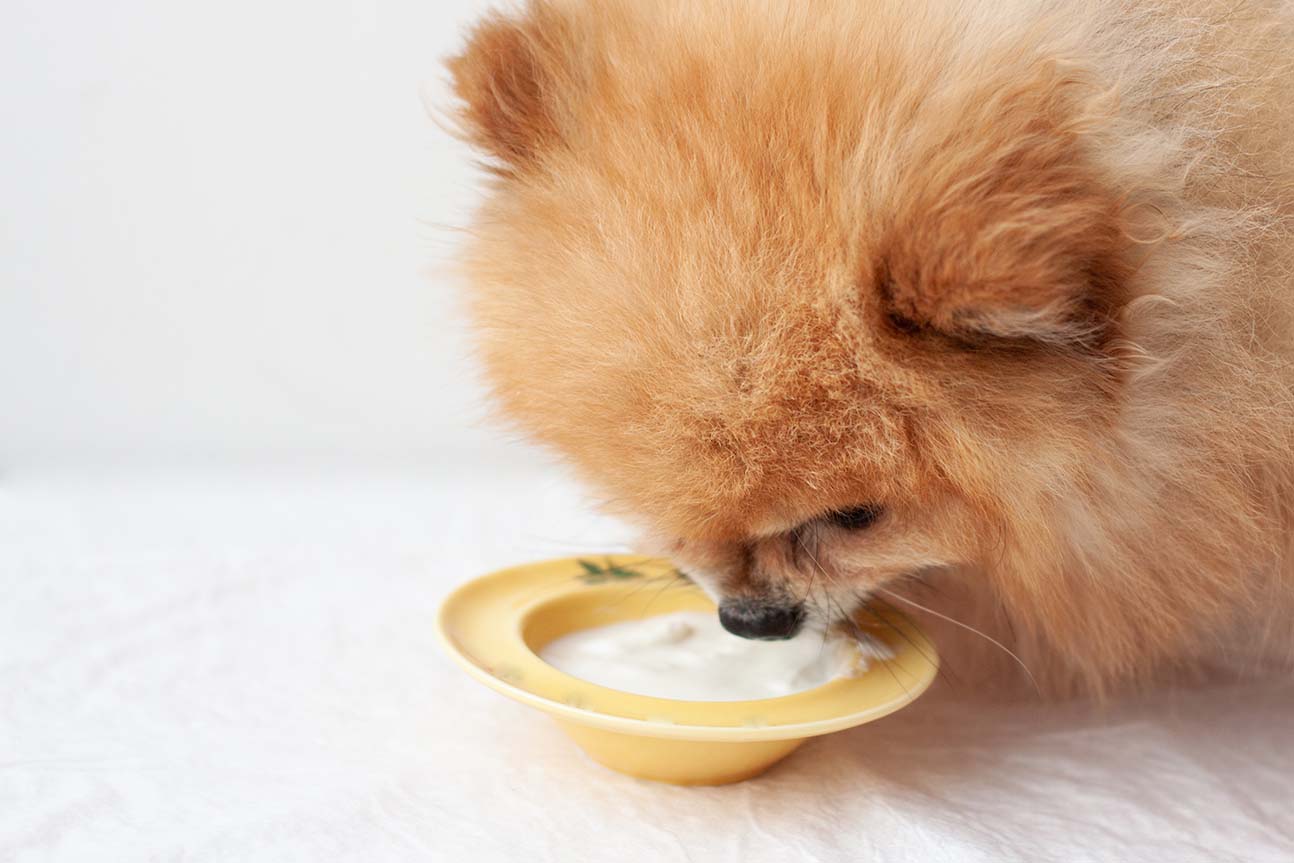Reviewed by Dr. Sarah Yosry
Updated on 22/05/2025
Reading time 4 min.
Overview
Severity: Low
Life stage: All
Diarrheal issues among dogs are a subject of worry to many pet owners, and it is caused by a range of possible triggers, ranging from dietary changes to infections or even stress. Diarrhea in dogs prompts pet owners to question if there are any safe and efficient natural ways to calm their stomach. Many pet owners are left wondering if yogurt is safe to give to a dog suffering from diarrhea.
The following article will discuss the advantages of using yogurt on dogs suffering from diarrhea, the risks associated with it, and when to seek the help of a clinic close to me or Modern Vet Hospital Dubai.
Reasons behind Diarrhoea in dogs:
Canine diarrhea has a multitude of causes, which include:
• Dietary indiscipline: Consuming something they shouldn’t have to eat, like rubbish or rotten food.
• Food intolerance or allergy: Some dogs are sensitive to ingredients used in their food.
• Infections caused by bacteria or viruses: Parvovirus, Salmonella, or Giardia infections may result in gastrointestinal upset.
• Stress or anxiety: Environmental changes or travel can affect your dog’s digestion.
• Parasites: Intestinal parasites or worms may result in diarrhea.
• Medications: Certain medications, including antibiotics, can disrupt the balance of gut bacteria.
Identifying the reason why your dog has diarrhea is essential before treating it. In case the diarrhea lasts for more than a day or is further accompanied by vomiting, lethargy, or blood in feces, a veterinarian clinic dubai appointment is essential to diagnose and treat accordingly.
Why Is Yogurt Considered Beneficial?
Yogurt is commonly used to treat digestive problems in humans and has left many pet owners to question if it will serve a corresponding good purpose in treating diarrhea in dogs. The main reason why yogurt could work on diarrhea in dogs is that it contains probiotics, which are live bacteria that help establish a healthy population of gut bacteria. Probiotics help restore the normal population of bacteria in the intestines following diarrhea induced by an infection or dietary mishap.
Probiotics contained in yogurt could assist dogs by:
• Normalizing the gut flora: Diarrhea has the potential to interfere with the normal bacterial balance in a dog’s intestines. Yogurt contains probiotics that will replace the good bacteria.
• Boosting the immune system: Probiotics may help boost the immune system by ensuring a healthy gut ecosystem required to maintain overall wellness.
• Enhancing digestion: Yogurt improves digestion and alleviates gastrointestinal distress by promoting healthy gut bacteria.
While yogurt is beneficial to some dogs, though, it is also essential to note when and how to utilize it.
Signs Your Dog Might Benefit from Yogurt
Dietary Indiscretion with Mild Diarrhea
If the diarrhea of your dog is caused by eating too much fatty food or a new food item, a little plain and unsweetened yogurt may solve the problem. Yogurt contains probiotics, which will help to restore the gut balance of your dog and make it easier to digest.
If the dog has a loose stool or two but is healthy, the occasional serving of yogurt may prove helpful. Nevertheless, if diarrhea lasts for a period greater than 24 hours or is preceded by some other symptoms, it is necessary to call a vet clinic for a further check-up.
Recovery After Antibiotics
If the dog has been on antibiotics because of an infection, the drug can upset the good bacteria in their intestines. In such situations, feeding small portions of yogurt will help to realign the beneficial bacteria and avoid the diarrhea usually resulting from antibiotics. Use plain, unsweetened yogurt with active cultures.
Stress Diarrhea
At times, diarrhea is brought about by stress, like travelling or a change in the household. In such a case, providing yogurt might serve to calm down your dog’s stomach and minimize gastrointestinal distress. Nonetheless, if diarrhea in your dog persists or is serious, it is best to visit a nearby vet clinic to deal with the root cause of the stress.
When Not to Give Yogurt to Your Dog
While yogurt is beneficial to some dogs with mild diarrhea, there are certain circumstances when it might not be suitable:
Lactose Intolerance
Most dogs are lactose intolerant and are unable to digest lactose, a type of sugar in milk and milk products. If your dog is lactose intolerant, eating yogurt will exacerbate the diarrhea and cause more gastrointestinal symptoms such as bloating, gas, and stomach cramps.
The signs of a lactose-intolerant dog include:
• Increased gas
• Diarrhea following the consumption
• Stomach upset
If any of the following symptoms are presented by your dog, do not feed him/dog yogurt or any milk products and seek advice from a veterinarian on alternative options.
Severe or Prolonged Diarrhea
If the diarrhea in your dog is severe, persists for several days, or has additional symptoms like vomiting, lethargy, or fever, it is not a substitute for a vet visit. In such situations, it is imperative to bring the dog to a vet clinic Dubai to receive proper diagnosis and care. More than a day of diarrhea or diarrhea occurring with blood may signify a more serious condition, and immediate medical care is required.
Allergic Reactions to Dairy
Some dogs are also allergic to milk products, and even a small quantity of yogurt might result in an allergic response. In case you are unsure if a dairy allergy is affecting a dog, it is safest to exclude yogurt and talk to a veterinarian before experimenting with any foods.
How to Safely Give Yogurt to Your Dog
If you do choose to feed your pet yogurt to alleviate mild diarrhea, it is vital to do it safely:
Select Plain, Unsweetened Yogurt
Always choose plain yogurt with no added sugars, sweeteners, or flavorings. Xylitol sweeteners are poisonous to dogs and are to be avoided under all circumstances. Opt for plain, unsweetened live active culture yogurts to achieve maximum effect on the digestive system of your dog.
Begin with Small Quantities
Gradually introduce the yogurt in small quantities to test how your dog responds to it. One or two teaspoons are good sizes to start with small dogs, and larger dogs may tolerate up to two tablespoons. Keep a close eye on how the dog responds to avoid any undesirable effects.
Monitor for Digestive Changes
If diarrhea, gas, or any signs of distress increase, stop the yogurt and contact your veterinarian. All dogs are individuals, and some do not respond to yogurt.
Alternatives to Yogurt for Dogs with Diarrhea
If yogurt is not appropriate for your dog, support for their digestive system is available through other means:
• Probiotic supplements: Specially made probiotic supplements are available for dogs to help maintain a healthy gastrointestinal system without risking lactose intolerance.
• Bland diet: Feed your dog a bland diet of boiled chicken and rice, as it is a gentle-on-the-stomach diet and has been shown to firm up stool.
• Hydration: Keep your dog hydrated to avoid dehydration due to diarrhea. Provide water or an electrolyte drink to restore fluids lost.
Conclusion
While yogurt may serve as a helpful additive in the diets of certain dogs with mild diarrhea, caution is advised. Keep a close eye on your dog for any indicators of lactose intolerance or allergy, and call a veterinary clinic if diarrhea persists or increases.
If you seek professional advice or if your dog’s condition necessitates additional care, do not hesitate to make a consultation appointment with Modern Vet Hospital Dubai. Schedule an appointment now at https://bookme.modernvet.com/ and receive expert care and counsel.
Share this, choose your platform!
Writen by
Dr.Sarah Yosry
DVM
A product of a rich Australian/Egyptian heritage, Dr. Sarah Yosry stands as a testament to the union of diverse cultures and a shared love for animals.



